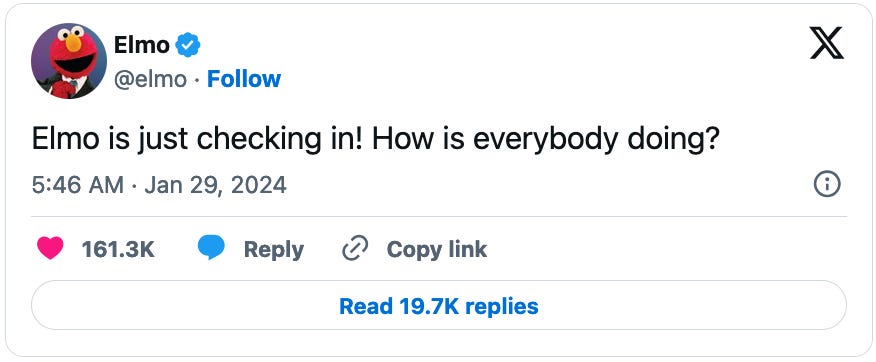Thank you for reading Telling the Future! Telling the Future is growing steadily—the number of subscribers grew 45% in 2024—but still needs significantly more paying subscribers to be viable in the long run. So if you enjoy my work, please consider supporting it by buying a paid subscription.
The New Year in Hawaiʻi begins with a bang. Every neighborhood in Honolulu lights up with fireworks starting around 9:00 pm on New Year’s Eve. The celebratory chaos reaches a crescendo at midnight as a chorus of cheers and cheehoos goes up through the smoke across the islands. The pyrotechnics allow us to step for a moment outside the linear stream of ordinary events and participate in a recreation of the cosmic act of creation. We made it another year, in spite of everything.
The recent US election convinced me I need to follow the news less closely. My work obviously requires me to follow political news to some extent, but there’s no need for me to attend to the details of every sordid drama pushed to us. If anything the constant noise prevents me from taking an outside view and seeing the larger picture. If I miss something significant when it happens I can always revisit it later when it’s easier to see more clearly what matters. With a media system built to monetize outrage—rather than to inform or benefit us—and a country about to embark upon four years of government by shitposting—we’ve already been inundated with tiresome bullshit—the circus is likely to just get worse.
Governments are in turmoil around the world—it’s not just US voters who have been demanding change—and I think Daniel Drezner is probably right when he suggests people are at their breaking point everywhere. We want change and we’re likely to get some. The US is already experiencing a surge of political violence, with people on the left celebrating the killing of the CEO of a healthcare company and people on the right celebrating the killing of a mentally ill homeless man. The image of a burning Cybertruck in front of the Trump Hotel in Las Vegas seems like a heavy-handed metaphor for the mood of the country at the start of the year.
My most popular posts last year—of course—were about the US election. But unfortunately they weren’t my best forecasts because I underestimated the strength of anti-status-quo sentiment in the US and overestimated the chances Democrats would win the Presidency and the House (I was right at least that Democrats were unlikely to keep control of the Senate and that third party candidates wouldn’t win a lot of votes). Now that the US election is over I recommend you catch up on my other posts you may have missed, like my interview with global health researcher Saloni Dattani about life expectancy and my essay on why Henry Kissinger saw Donald Trump as a Hegelian hero.
My guess is that 2025 will be a year of radical change. We’re still unhappy with the status quo; the dramatic shifts that got underway last year will continue. We’re close to technological innovations that have the potential to transform society in ways that are hard to foresee. Changing norms will also make the year hard to predict; things that used to be unthinkable will come to pass. I’ll do my best to tune out the noise and focus on what matters. I’m less certain than ever about what lies ahead of us, but I’m grateful to you for joining me as we live through history.
What do you think will happen in 2025? Will there be a ceasefire in Ukraine? Will China blockade Taiwan? Will it be remembered as the year AI surpasses human intelligence? Share your predictions in the comments.








You wrote: "My guess is that 2025 will be a year of radical change." I think I agree with that.
A paragraph later you asked: "Will there be a ceasefire in Ukraine? Will China blockade Taiwan? Will it be remembered as the year AI surpasses human intelligence?" And my answers (non-probabilistic) are no, no, and no.
So do I really think it will be a year of radical change in that case? That struck me as a tough split.
I'm a month late, but here are some quick guesses:
- AI is going to become even more important. In particular, I think AI agents are slowly going to become more mainstream. It's probably not quite going to be "AGI" in the conventional sense though.
- A good chunk of the US federal government is probably going to be gone or at least radically defunded by the end of the year because of DOGE. This might have some drastic consequences (though which ones exactly depends on which departments would be cut, which I'm more uncertain about)
- Not much is going to change war-wise. Probably 1-2 wars will start or end, as in the past few years. One possible (though unlikely in my opinion) war scenario is if Donald Trump *actually* decides to make good on his claims to take Canada or Panama or Greenland or the Gaza Strip (in descending order of plausibility), and the latter fights back.